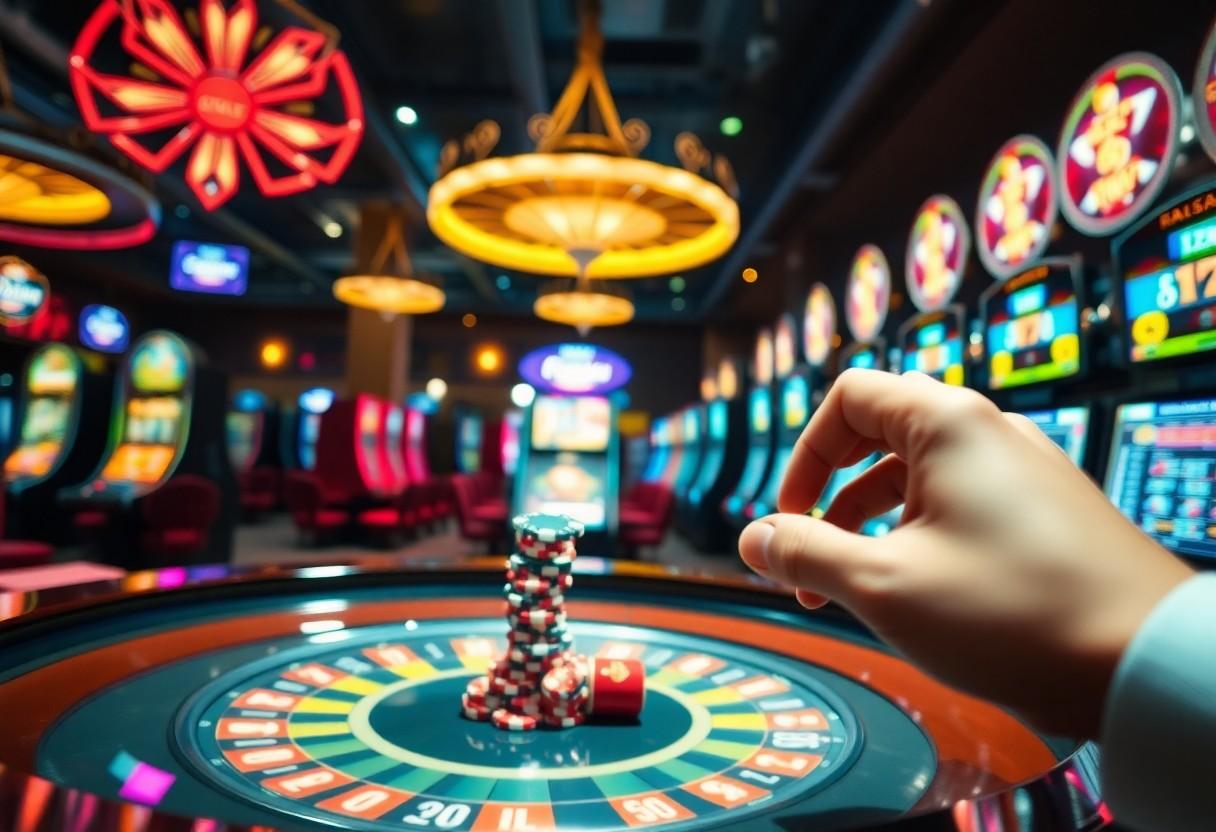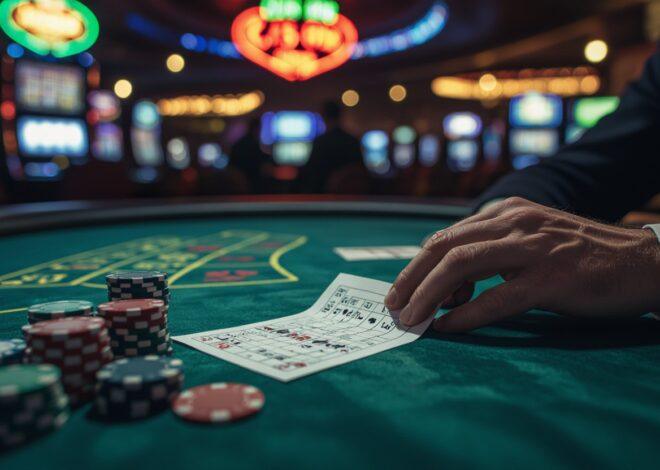
Psychological tricks online casinos use to keep you playing
Many online casinos employ sophisticated psychological tactics designed to keep you engaged and spending money longer than you initially planned. These digital gambling platforms use carefully crafted algorithms and design elements that tap into your brain’s reward systems, creating an environment where time seems to disappear and losses feel less significant. From intermittent reinforcement schedules that trigger dopamine releases to visual and auditory cues that simulate winning, these establishments have mastered the art of behavioral manipulation. Understanding these techniques can help you recognize when you’re being influenced and make more informed decisions about your online gambling activities.
The Psychological Foundations of Gambling Behavior
Your brain’s reward system operates on predictable patterns that casinos have studied extensively through decades of behavioral research. Dopamine releases occur not just when you win, but in anticipation of potential wins, creating a powerful neurochemical loop that keeps you engaged. This anticipation actually triggers stronger dopamine responses than the win itself, explaining why you feel compelled to continue playing even during losing streaks. Casinos exploit this biological mechanism by designing games with frequent near-misses and variable reward schedules that maximize your brain’s anticipation response.
The Role of Instant Gratification
Digital slot machines and instant-play games deliver results within seconds, perfectly aligning with your brain’s preference for immediate rewards over delayed ones. Studies show that reducing the time between bet and outcome from 3.5 seconds to 2.5 seconds increases play duration by 40%. Online platforms eliminate traditional delays like waiting for cards to be dealt or chips to be counted, creating a continuous cycle where your next dopamine hit is always just one click away. This rapid-fire stimulation overwhelms your rational decision-making processes, making it harder to pause and assess your spending.
The Illusion of Control in Chance Games
Online casinos carefully design interfaces that make you feel like your choices influence purely random outcomes. Features like “stop” buttons on slots, card selection in digital poker, and timing-based betting options create false agency in games governed entirely by algorithms. Your brain interprets these interactive elements as skill-based opportunities, even when the mathematical odds remain unchanged regardless of your actions.
Research conducted by the University of Waterloo found that players who could press a button to stop slot reels believed they had 25% more control over outcomes compared to automatic spins, despite identical random number generation. Online platforms amplify this illusion through features like “hot” and “cold” game indicators, betting pattern suggestions, and historical data displays that suggest patterns in random events. Your cognitive biases naturally seek patterns and causal relationships, making you vulnerable to these carefully crafted illusions of influence. The more control you perceive, the more likely you are to increase bet sizes and extend playing sessions, believing your “strategy” will eventually overcome mathematical house edges.
The Design Elements that Enhance Engagement
Every visual and auditory element on casino websites serves a calculated purpose in your psychological manipulation. Designers spend months testing color combinations, button placements, and interface layouts to maximize your playing time. Studies show that players spend 23% longer on sites with optimized engagement designs compared to basic interfaces. Your brain responds to these carefully crafted elements before you consciously process them, creating subconscious urges to continue playing that feel like personal choices rather than programmed responses.
Color Psychology and Game Layout
Red dominates casino interfaces because it triggers excitement and urgency in your nervous system, while gold accents suggest wealth and success. Green “play” buttons exploit your brain’s association with safety and “go” signals, making clicking feel natural and risk-free. Slot machines position winning combinations at eye level, while loss information appears in smaller fonts below. The strategic placement of bright, flashing elements draws your attention away from your balance and time spent playing, keeping your focus locked on the next potential win.
Sound Effects and Reward Feedback Loops
Casino sound designers use the same frequency patterns found in video game achievements and smartphone notifications to trigger dopamine releases in your brain. Winning sounds play 40% longer than losing sounds, creating a psychological imbalance that makes victories feel more significant than defeats. Near-miss combinations produce celebratory audio despite being losses, tricking your brain into categorizing them as partial successes worth pursuing again.
These audio cues become deeply embedded in your subconscious through repetition and conditioning. Your brain begins anticipating the reward sounds before you even see the results, creating a Pavlovian response that keeps you spinning. Modern online slots layer multiple sound frequencies simultaneously – high-pitched chimes for excitement, low bass tones for importance, and rhythmic patterns that match your heartbeat during moments of anticipation. Even the ambient background music maintains specific tempos proven to reduce your perception of time passing, while silence during losses creates an uncomfortable void that you instinctively want to fill with another bet.
The Impact of Social Proof and Community Dynamics
Online casinos masterfully exploit your natural tendency to follow the crowd by creating artificial communities that make gambling feel like a shared social experience. Chat rooms displaying fabricated conversations about big wins, real-time notifications of other players’ jackpots, and community challenges transform solitary gambling into what appears to be a thriving social activity. These platforms strategically showcase player activity through live feeds, winner announcements, and interactive features that make you feel part of an exclusive group where everyone else seems to be winning consistently.
The Power of Leaderboards and Competition
Leaderboards tap into your competitive instincts by displaying rankings that often feature manipulated or cherry-picked data to make reaching the top seem achievable. Casino platforms frequently reset these boards at strategic intervals, ensuring fresh motivation cycles while highlighting prizes that create urgency. Your position relative to others becomes a powerful motivator, especially when you’re shown as “just a few points away” from the next tier, prompting continued play to maintain or improve your ranking against what may be largely fictional competition.
Utilizing Testimonials and Player Stories
Casinos flood their platforms with carefully curated success stories and testimonials that paint gambling as a reliable path to financial freedom. These narratives often feature fabricated players with stock photos or heavily edited accounts that omit crucial details about losses, creating a false impression of widespread success among regular users.
Professional copywriters craft these testimonials using specific psychological triggers, focusing on relatable backgrounds like “single mother” or “college student” to maximize emotional connection. The stories typically follow predictable patterns: initial skepticism, small wins building confidence, then life-changing jackpots that solve financial problems. Research shows that 73% of online casino testimonials contain embellished or entirely fictional elements, yet they remain highly effective because they exploit your confirmation bias. You naturally gravitate toward information that supports your desire to believe gambling can be profitable, while dismissing warnings about the mathematical certainty of long-term losses. These testimonials are strategically placed near registration forms and deposit buttons, timing their psychological impact precisely when you’re most vulnerable to persuasion.
The Subscription Effect: Loyalty Programs and Bonuses
Casinos transform occasional players into committed customers through sophisticated loyalty programs that mirror subscription services. VIP tiers create artificial scarcity and status anxiety, making you feel special while simultaneously trapping you in escalating commitment cycles. These programs exploit your psychological need for progress and recognition, turning gambling losses into perceived investments in your membership status. The more you play, the more “valuable” your account becomes, creating a sunk cost fallacy that makes walking away feel like abandoning accumulated worth.
How Rewards Create Commitment
Loyalty points and tier systems activate the same psychological mechanisms that make gym memberships and streaming services sticky. Casinos typically offer rewards worth only 0.1-0.5% of your total wagering, yet players often chase these minimal returns with disproportionate spending. Your brain interprets these small rewards as validation of your gambling decisions, creating positive reinforcement loops that override rational cost-benefit analysis. The anticipation of reaching the next tier or unlocking exclusive bonuses becomes more motivating than the actual monetary value of the rewards themselves.
The Psychology Behind Subscription Models
Casino loyalty programs borrow heavily from subscription psychology, where perceived ownership increases with time and investment. Your VIP status feels earned rather than purchased, creating emotional attachment to your player account. This psychological ownership makes you more likely to defend your gambling habits and continue playing to “protect” your accumulated benefits.
The subscription model psychology extends beyond simple rewards into identity formation. Casinos deliberately use exclusive language like “Diamond Elite” or “Platinum Member” to make you feel part of an exclusive club. This manufactured social identity becomes intertwined with your self-concept, making it psychologically painful to lose status by reducing play. Research shows that people will spend significantly more money to maintain a status they’ve achieved than they would to initially attain it. Casinos exploit this by setting monthly or quarterly activity requirements that force continued play to maintain your tier level, effectively creating a psychological subscription that auto-renews through your gambling behavior rather than your credit card.
The Threat of Loss Aversion
Your brain processes potential losses twice as intensely as equivalent gains, and online casinos exploit this fundamental psychological bias with ruthless precision. Loss aversion drives you to chase losses even when rational thinking would suggest stopping, creating a powerful psychological trap that keeps you clicking “spin” or “deal” long after your initial budget disappears. Casinos amplify this effect by presenting your declining balance in real-time, showing exactly how much you’ve already invested, and framing continued play as your only path to “recovery” rather than additional risk.
Understanding Risk and Reward Perception
Casinos manipulate your perception of risk by presenting small bets as “low-risk” opportunities while obscuring the cumulative impact of repeated play. A $5 spin feels insignificant until you realize you’ve made 200 spins in an hour, totaling $1,000 in wagers. They strategically display potential winnings in large, bright numbers while showing your actual losses in smaller, less prominent text. This skewed presentation makes rewards appear more probable and valuable than they actually are, while minimizing the psychological weight of your mounting losses.
The Chilling Effect of Near Misses
Near misses trigger the same neural pathways as actual wins, flooding your brain with dopamine despite losing money. Slot machines are programmed to deliver near misses approximately 30% more often than pure chance would dictate, creating an artificial sense that you’re “almost winning” consistently. Your brain interprets these near misses as evidence that you’re improving or that a big win is imminent, rather than recognizing them as calculated manipulations designed to extend your playing session.
Research from the University of Cambridge reveals that near misses activate the same reward circuits as actual victories, but with an added layer of frustration that compels continued play. Players who experience frequent near misses show increased betting intensity and longer playing sessions compared to those who lose cleanly. Casinos exploit this by programming their games to show you symbols just one position away from jackpots, or cards that would have completed winning hands if dealt in slightly different order. These “almost wins” create a psychological narrative that your next attempt will succeed, despite each spin or hand being completely independent with unchanged odds.
Final Words
With these considerations in mind, you now understand how online casinos strategically employ psychological techniques to extend your gaming sessions. These platforms use sophisticated methods including variable reward schedules, sensory stimulation, social proof mechanisms, and loss aversion tactics to influence your behavior. By recognizing these deliberate design choices, you can make more informed decisions about your online gambling activities. Understanding that every element from sound effects to bonus structures serves a specific psychological purpose empowers you to maintain better control over your gaming experience and spending habits.

